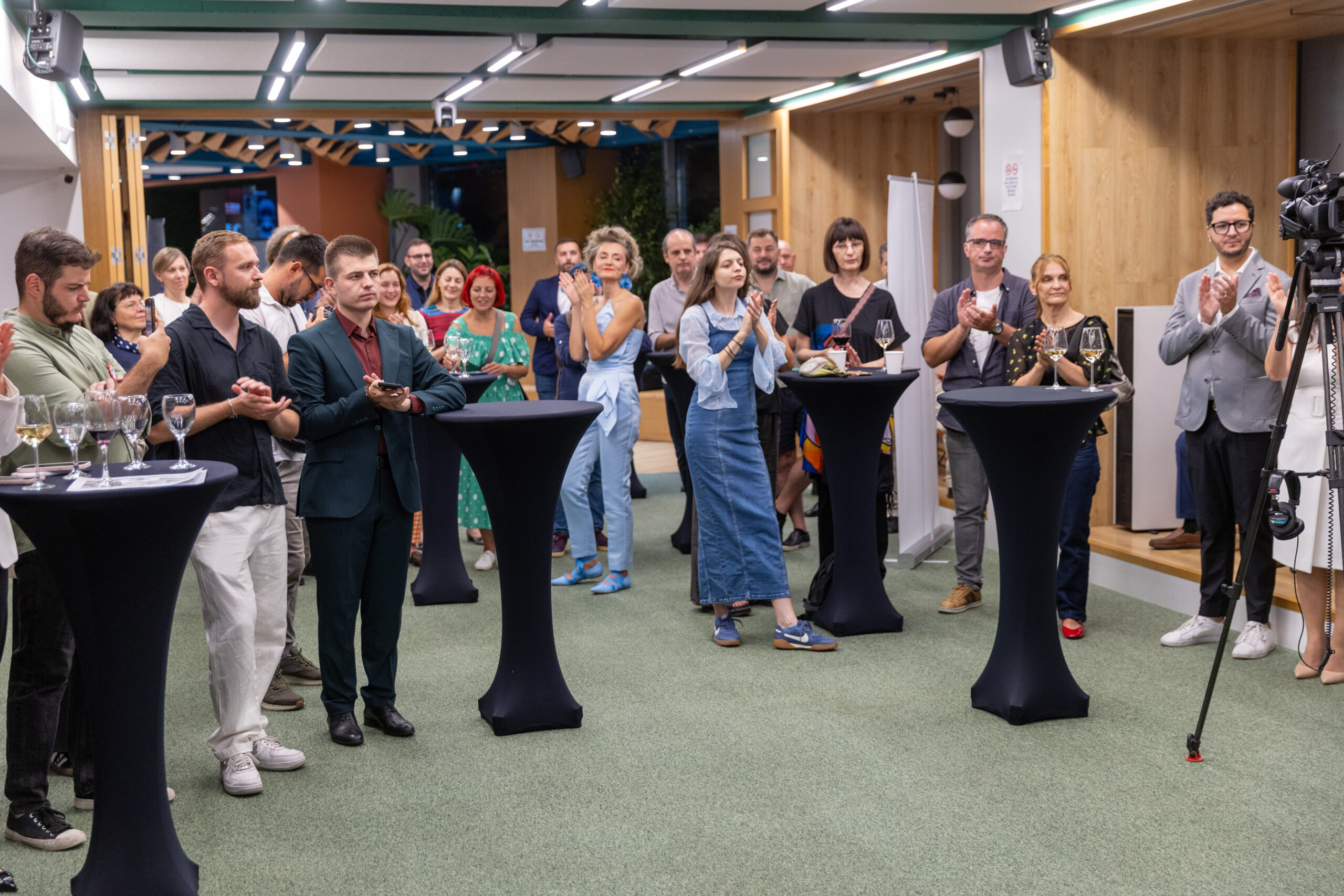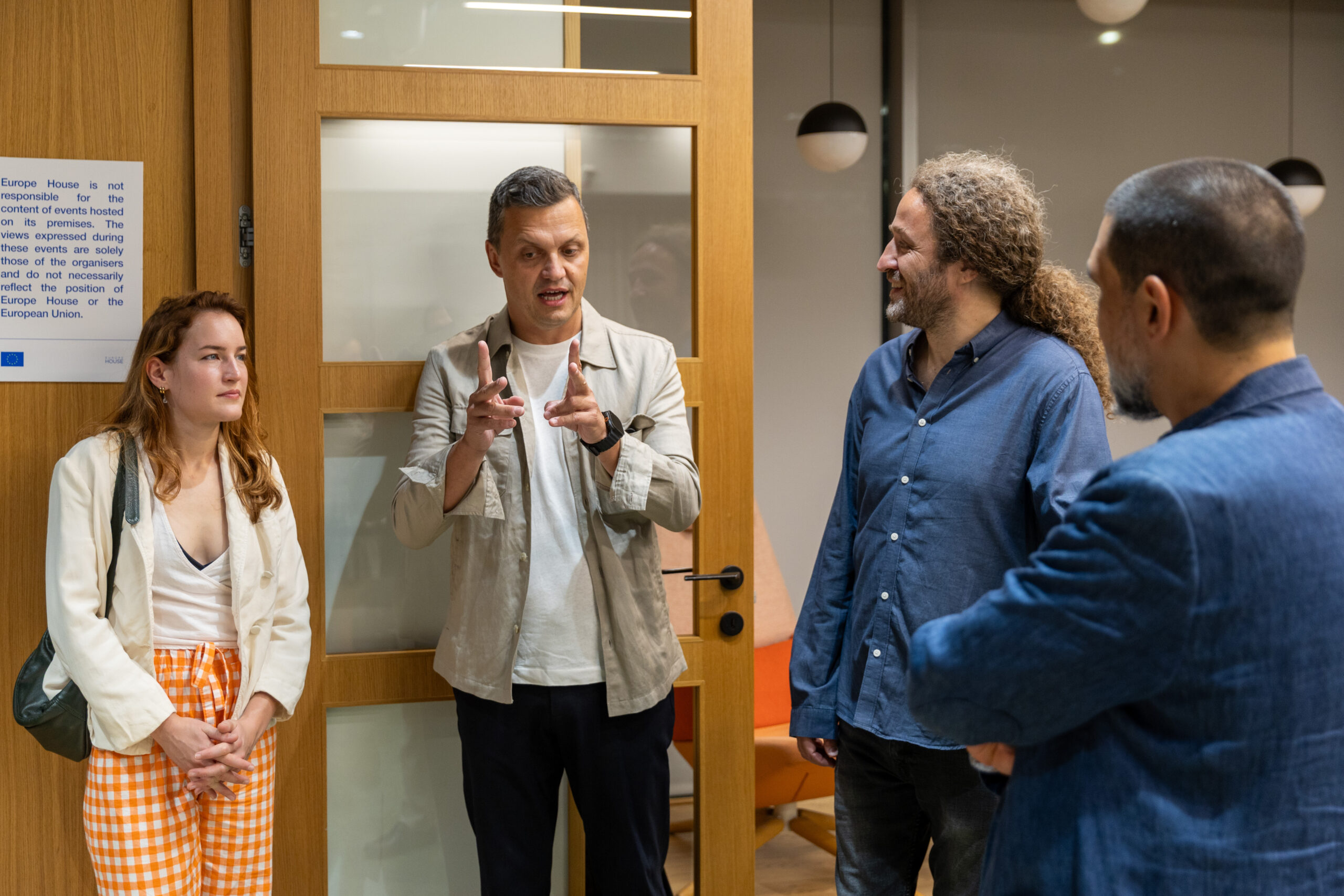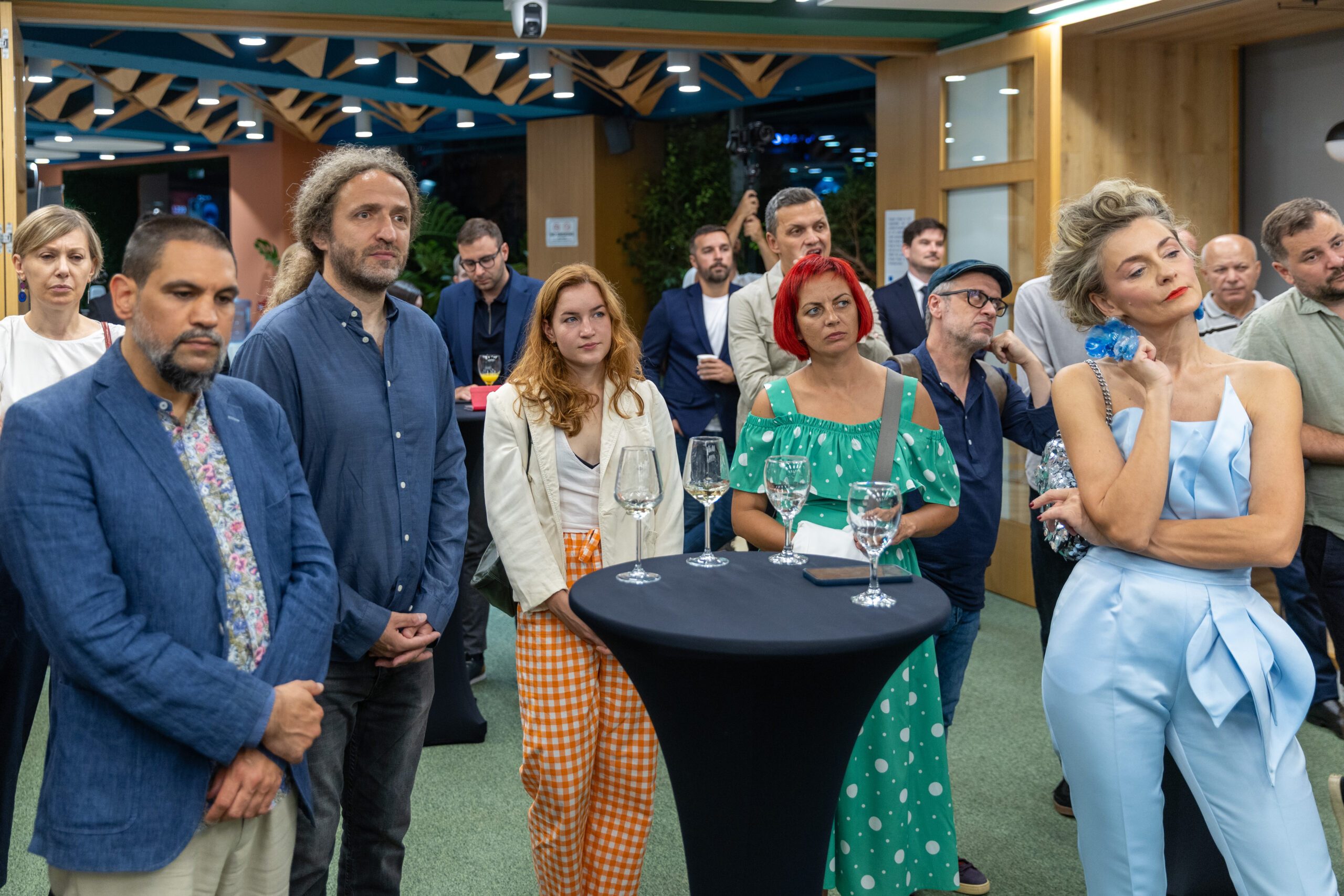
Art and performance have proven to be extremely powerful tools for driving change and reforms, because audiences understand art more easily than academic symposia, conferences or political analyses. To highlight the unifying power of culture and art, WeBalkans created One Song – One Europe.
The European Union offers the Western Balkans not only symbolic belonging, but also real, tangible benefits. It is about building a common space of mutual respect, equal partnership and shared ownership of Europe’s future. Moving toward EU membership does involves more than institutional alignment: it also requires renewing renewing cultural ties and building a future of peace, progress and shared prosperity. As the region’s closest and strongest cultural and economic partner, the EU promotes reconciliation and long-term stability by investing in people, culture and common values.
Through its Creative Europe programme alone, in which 40 countries take part, the European Union has allocated €2.44 billion to culture and creativity for the period 2021–2027. Cultural institutions from the Western Balkans (Albania, Bosnia and Herzegovina, Montenegro, Kosovo, Serbia and North Macedonia), like theatres, museums, research networks, film centres and publishing houses,receive significant EU funding each year. They see this support as a driver of growth and an opportunity for development.

“At the cartoon festival held every September in Kosovo, entries come from 70 countries: Bosnia and Herzegovina, Serbia, North Macedonia, Bulgaria, Albania, the Czech Republic and many others around the world. The significance is clear: we in Kosovo do not often travel to Serbia, and the same is with people from Serbia but our cartoons travel – and people understand the messages perfectly. EU funding enables us to organise such events, or to attend similar ones abroad. It helps us to meet others, discover different cultures and artistic achievements, and improve ourselves”, explains cartoonist Imri Musliu from the Kosovo Cartoonists’ Association Kopriva/Nettle.
The association where Musliu works (Shoqata e Karikaturistëve “HITHI”), in partnership with the organisation Moja Kariera from North Macedonia, received support through the “Culture and Creativity for the Western Balkans” (CC4WBs) programme for the project Building an Efficient Network through the Enhancement of Individual Presentation. This programme is funded by the EU and jointly implemented by UNESCO, the British Council and the Italian Agency for Development Cooperation. Its aim is to strengthen intercultural dialogue and to increase the social and economic impact of culture and creativity in the Western Balkans – a region rich in diverse cultural heritage and with a vibrant scene for creative industry professionals.
There are also those who emphasise that some cultural and artistic undertakings would never have happened without EU support. For example, the Youth Film Festival (OFF) from Bosnia and Herzegovina received significant funding from the CC4WB fund.
“Without that support we would never have been able to deliver the Youth Experience programme. Thanks to EU funding, we launched exchanges within the Western Balkans and between the Balkans and the EU, because we share the same values and criteria. In Bosnia and Herzegovina, but also in Serbia and North Macedonia, the role of public institutions in financing new projects is very unclear – funds are usually channelled into already established activities. Support from funds such as CC4WB becomes essential, as an initial impulse that can completely transform the perspectives of artists and cultural workers”, explains Kenan Musić, director of the OFF.
Thanks to European funding, citizens of Sarajevo also enjoyed a concert by the Roma rock band Kal, led by musician and activist Dragan Ristić. He is also President of the Roma Cultural Centre citizens’ association in Serbia, which, together with the Serbian association Eutopia and the Roma youth association Aksiom from Bosnia and Herzegovina, received support through a CC4WB project.
“For us, EU support is like a window onto the world. It enables us to achieve our aims and the aims of our ethnic community. The EU has made it clear to all Western Balkan countries that priority is given to supporting vulnerable groups, especially Roma“, says Ristić.
His partner from the Aksiom association, Dalibor Tanić, says that through this project he realised how art is an exceptionally powerful means of driving change.
“By fighting together discrimination and prejudice on one side, and corruption on the other, we organised a series of concerts and debates that connected whistleblowers and Roma as equally vulnerable groups. It turned out that art and performance are extremely powerful tools for those who want change, because audiences understand art much more easily than academic symposia, conferences or political analyses. They connect far more quickly with a work of art”, says Tanić.
In early September 2025, European Commissioner for Enlargement Marta Kos stated that EU enlargement is at the top of the European agenda, stressing that it is about the unification of Europe.
“The doors of our Union are open and will remain open to those who fully, fairly and transparently meet the criteria. Optimism is justified, because things are moving faster than at any time in the past fifteen years”, said Kos.

To highlight the symbol of closeness through culture and art, WeBalkans created One Song – One Europe. Using the powerful symbolism of Ode to Joy, musicians from Albania, Bosnia and Herzegovina, Bulgaria, the Czech Republic, Germany, France, Kosovo, Montenegro, the Netherlands, North Macedonia, Serbia and Slovenia came together in harmony. With instruments ranging from classical to traditional, rare to modern, their performance reflects the cultural strength and unity of Europe. By supporting artists, cultural cooperation and creative exchanges, the EU enables musicians and creators from the Western Balkans and Member States to inspire each other, showing how cultural connectedness is one of Europe’s greatest strengths.
“For me, Ode to Joy is the EU translated into emotions – a collection of articulated sounds that make music”, says Ristić.
In close cooperation with the EU Delegation to North Macedonia and Europe House in Skopje, WeBalkans launched the One Song, One Europe campaign. The event gathered musicians from 12 countries, alongside regional and North Macedonian media, international journalists, members of the diplomatic corps, and Young European Ambassadors. The vibrant atmosphere of the kick-off highlighted the importance of culture as a bridge across borders.
“One Song One Europe tells the story of Europe’s unity in diversity, embracing all people and cultures. Through the powerful symbolism of Ode to Joy, musicians from twelve countries—Albania, Bosnia and Herzegovina, Bulgaria, the Czech Republic, Germany, France, Kosovo, Montenegro, the Netherlands, North Macedonia, Serbia, and Slovenia—come together here tonight in Skopje. Playing instruments that range from classical to traditional, rare to modern, their performance embodies Europe’s cultural strength and unity. By supporting artists, cultural collaboration, and creative exchange, the European Union enables musicians and creators from both the Western Balkans and the Member States to inspire one another, demonstrating that cultural connection is one of Europe’s greatest strengths” said Luciano Scambiato Licciardi, Head of Communications, EU Delegation To North Macedonia
In addressing the audience from the WeBalkans, it was also emphasized that the European Union is the Western Balkans’ strongest cultural and economic partner. The EU offers not only symbolic belonging, but also tangible opportunities—building a common space founded on mutual respect, equal partnership, and shared ownership of Europe’s future. The path to EU accession is not only about aligning institutions, but also about renewing cultural ties and shaping a future of peace, progress, and prosperity. As the region’s closest partner, the EU continues to foster reconciliation and long-term stability by investing in people, culture, and shared values what is the message of One Song One Europe campaign
There are also those who emphasise that some cultural and artistic undertakings would never have happened without EU support. For example, the Youth Film Festival (OFF) from Bosnia and Herzegovina received significant funding from the CC4WB fund.
“Without that support we would never have been able to deliver the Youth Experience programme. Thanks to EU funding, we launched exchanges within the Western Balkans and between the Balkans and the EU, because we share the same values and criteria. In Bosnia and Herzegovina, but also in Serbia and North Macedonia, the role of public institutions in financing new projects is very unclear – funds are usually channelled into already established activities. Support from funds such as CC4WB becomes essential, as an initial impulse that can completely transform the perspectives of artists and cultural workers”, explains Kenan Musić, director of the OFF.
Thanks to European funding, citizens of Sarajevo also enjoyed a concert by the Roma rock band Kal, led by musician and activist Dragan Ristić. He is also President of the Roma Cultural Centre citizens’ association in Serbia, which, together with the Serbian association Eutopia and the Roma youth association Aksiom from Bosnia and Herzegovina, received support through a CC4WB project.
“For us, EU support is like a window onto the world. It enables us to achieve our aims and the aims of our ethnic community. The EU has made it clear to all Western Balkan countries that priority is given to supporting vulnerable groups, especially Roma“, says Ristić.
His partner from the Aksiom association, Dalibor Tanić, says that through this project he realised how art is an exceptionally powerful means of driving change.
“By fighting together discrimination and prejudice on one side, and corruption on the other, we organised a series of concerts and debates that connected whistleblowers and Roma as equally vulnerable groups. It turned out that art and performance are extremely powerful tools for those who want change, because audiences understand art much more easily than academic symposia, conferences or political analyses. They connect far more quickly with a work of art”, says Tanić.
In early September 2025, European Commissioner for Enlargement Marta Kos stated that EU enlargement is at the top of the European agenda, stressing that it is about the unification of Europe.
“The doors of our Union are open and will remain open to those who fully, fairly and transparently meet the criteria. Optimism is justified, because things are moving faster than at any time in the past fifteen years”, said Kos.

To highlight the symbol of closeness through culture and art, WeBalkans created One Song – One Europe. Using the powerful symbolism of Ode to Joy, musicians from Albania, Bosnia and Herzegovina, Bulgaria, the Czech Republic, Germany, France, Kosovo, Montenegro, the Netherlands, North Macedonia, Serbia and Slovenia came together in harmony. With instruments ranging from classical to traditional, rare to modern, their performance reflects the cultural strength and unity of Europe. By supporting artists, cultural cooperation and creative exchanges, the EU enables musicians and creators from the Western Balkans and Member States to inspire each other, showing how cultural connectedness is one of Europe’s greatest strengths.
“For me, Ode to Joy is the EU translated into emotions – a collection of articulated sounds that make music”, says Ristić.
In close cooperation with the EU Delegation to North Macedonia and Europe House in Skopje, WeBalkans launched the One Song, One Europe campaign. The event gathered musicians from 12 countries, alongside regional and North Macedonian media, international journalists, members of the diplomatic corps, and Young European Ambassadors. The vibrant atmosphere of the kick-off highlighted the importance of culture as a bridge across borders.
“One Song One Europe tells the story of Europe’s unity in diversity, embracing all people and cultures. Through the powerful symbolism of Ode to Joy, musicians from twelve countries—Albania, Bosnia and Herzegovina, Bulgaria, the Czech Republic, Germany, France, Kosovo, Montenegro, the Netherlands, North Macedonia, Serbia, and Slovenia—come together here tonight in Skopje. Playing instruments that range from classical to traditional, rare to modern, their performance embodies Europe’s cultural strength and unity. By supporting artists, cultural collaboration, and creative exchange, the European Union enables musicians and creators from both the Western Balkans and the Member States to inspire one another, demonstrating that cultural connection is one of Europe’s greatest strengths” said Luciano Scambiato Licciardi, Head of Communications, EU Delegation To North Macedonia
In addressing the audience from the WeBalkans, it was also emphasized that the European Union is the Western Balkans’ strongest cultural and economic partner. The EU offers not only symbolic belonging, but also tangible opportunities—building a common space founded on mutual respect, equal partnership, and shared ownership of Europe’s future. The path to EU accession is not only about aligning institutions, but also about renewing cultural ties and shaping a future of peace, progress, and prosperity. As the region’s closest partner, the EU continues to foster reconciliation and long-term stability by investing in people, culture, and shared values what is the message of One Song One Europe campaign
Please wait while your video is being uploaded...
Don't close this window!